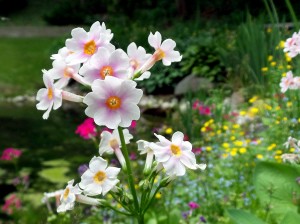 ALEXANDRA RISEN’s Unearthed: Love, Acceptance and Other Lessons from an Abandoned Garden is her meditation on our interconnectedness with nature and family, a memoir published this summer in the United States by Houghton Mifflin Harcourt and in Canada by Penguin Random House. She is one of three founding editors of the online literary magazine Don’t Talk to Me About Love, which explores love in fiction, non-fiction, poetry, and art.
ALEXANDRA RISEN’s Unearthed: Love, Acceptance and Other Lessons from an Abandoned Garden is her meditation on our interconnectedness with nature and family, a memoir published this summer in the United States by Houghton Mifflin Harcourt and in Canada by Penguin Random House. She is one of three founding editors of the online literary magazine Don’t Talk to Me About Love, which explores love in fiction, non-fiction, poetry, and art.
Alexandra studied memoir writing with instructor Allyson Latta, who was also adviser for her Final Project toward the University of Toronto SCS Creative Writing Certificate. An excerpt from that version of her memoir was a finalist for the university’s Marina Nemat Creative Writing Award.
Alex, you’ve written elsewhere on this website [“Seven: On learning to embrace revision”] about the process of revising that’s so necessary to effective writing. Over time, as you heard suggestions from instructors, writing group members, agent, and in-house editors, how hard was it to balance their input with your own instincts about the direction the story should take? Do you have any advice on this for other writers?
The two important themes I wanted to communicate are our interconnectedness with and the healing properties of nature, and the meaning of personal legacy. In my memoir, these are intertwined. The story was revised many times as I worked through how to best present these themes, but the themes themselves never changed. I was flexible in the process of editing but single-minded in my ultimate message and concerning which scenes I wanted to share.
I would advise other memoirists to be as open-minded as possible, especially with strong editors. Editors have both experience and perspective and will help you share your story more effectively. Don’t take constructive feedback personally. The writer’s and editor’s goals are aligned: to produce the best possible narrative. Readers (who read a lot or are experts in your topic) may also provide valuable feedback. Seek them, and be grateful for all input, large or small. Sometimes a small comment from someone may result in a large idea in your head.
What aspects of writing do you find most challenging, and how do you approach these?
Writing, for me, is like solving a crossword puzzle. I have many ideas and scenes in my mind, thoughts and messages, and the process of how to integrate them into a story format is challenging, and also the most fun. It is difficult to layer storylines together in a way that the reader will find compelling. Transitions between scenes are key. I draw endless maps and create timelines and hang them on the wall to help with the process.
Would you share a couple of “aha” moments you experienced during the writing of your memoir?
One that comes to mind was when my agent read the ten interconnected short stories I’d written and suggested they be reorganized into a longer narrative. Another: when Allyson, my UofT Final Project adviser, pointed out that I had three storylines complicating the structure and vying for the reader’s attention. I had to make some difficult reductive decisions and braid the two that best served the story I wanted to tell.
There were also briefer but no less important “aha” moments along the way, such as when the ending came to me during a ravine walk. I had been struggling for several months over how to integrate it. And after two years of trying to come up with just the right title, I was driving up Bayview Avenue one day when the word Unearthed came to me. Some ideas take time to gel.
What do you wish you’d known about writing before you started?
There is lot to learn about the craft of writing. It requires study, practice, and patience. I wish I had started years earlier. And the more you read, of everything, the better.
If your parents were alive today, what do you imagine they’d say about Unearthed? Did thoughts of this influence the way you told your story?
I hope that they would understand that my memoir is a love letter to them, as well as a public expression of the appreciation and understanding I wish I had shown them sooner.
I tried not to stifle the process by worrying about what others would think during the first drafts. Those worries can be addressed in the editing process, if necessary.
When you walk through your beautiful garden now, does it mean something different to you as a result of the memories you’ve written about?
Yes, the garden grows every season and every year, and hopefully I grow with it. I’m grateful for that. But now, in this memoir, I also have an account to share with my son, who was quite young at the time and had forgotten some of our adventures until he read the book.
What is most surprising to you about the response so far to your memoir?
During the writing and even the publishing process, I didn’t think too much about future response, except to hope that my story would resonate with others, that people would look at a plant in a park differently, see the depth of someone they knew, or find the courage to reconcile with someone or something important to them.
What surprises me are the incredibly personal interactions I’ve had with readers on these topics, via conversations, letters, and social media. (Including readers who are friends, acquaintances, and even complete strangers whom I will likely never meet in person.) They have shared family histories, and stories about their parents, their children, and their gardens. They’ve sent pictures of their mothers in their gardens. They’ve thanked me for being honest (and imperfect) and for sharing my mistakes and my regrets. They’ve told me what my memoir has inspired them to do: explore their own parents’ wartime experience or forage with their kids. I’m humbled and thrilled to share in all their stories. Awed and grateful, I continue to learn and grow because of my readers, as well as from the garden.
